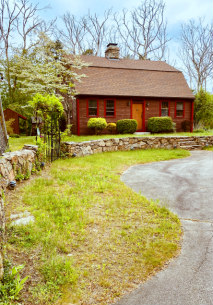Independent Living as an Accessory Dwelling Unit (ADU)
on a RI Home Property in 2022
The Rhode Island state legislature updated a law in 2022* that allows an independent housing unit on a single or multi family home property. This is what is known as an Accessory Dwelling Unit (ADU). Remember that ADU acronym and term because you will begin to read a lot more about it for accessible living arrangements.
In Rhode Island, an accessory dwelling unit (ADU) is a secondary residential unit that is located on the same property as a single-family or multi family home. ADUs are also known as in-law apartments, granny flats, separate housing or secondary suites. They are typically smaller than the main residence and may be attached or detached from the main home. There are a number of house plans for ADUs on line to review.
housing or secondary suites. They are typically smaller than the main residence and may be attached or detached from the main home. There are a number of house plans for ADUs on line to review.
ADU Specifics
Zoning ordinances for each of the RI towns must be complied with for the ADU including setbacks from property lines. If the ADU is to be built near or in a flood plain it must comply to town, FEMA flood plain requirements established and RI Coastal Resource requirements. Additionally, compliance with RI Department of Environmental Management on number of bedrooms that can be supported by the present septic system (if applicable).
State law does require that the accessory dwelling unit be put into evidence in the land records at the town hall. If there is a sale of the property in the future, the ADU transfers to the new owners. These changes are so important for the aging population in RI real estate and with the lack of affordable housing.
Please note that many other websites in RI reference the older 2020 legislative law on ADUs and are incorrect. This is the correct RI state law as of 2022 for Accessory Dwelling Units. Ensure you have the right information in hand.
Rhode Island law allows for the construction of ADUs in certain zoning districts and under conditions. Some of the requirements for building an Accessory Dwelling Unit include: the property must be zoned for single-family residential or multi-family use. The Accessory dwelling unit must meet all building code requirements and additional on site parking. Requirements, if you are thinking of adding an ADU to your property, should be discussed with the town building and/or planning departments to ensure town zoning compliance.
*Note: As of 2023 the RI state legislature has not passed statewide legislation enforcing all RI towns to comply. Please check with your town’s planning or buildingdepartment to determine if your town has a town ordinance on these dwelling units.
Best Friend for Accessory Dwelling Unit Information is Town Planning and Building Departments
Your ‘best friend’ with the correct information on your town’s ADUs is with your Planning and Building departments. Go there first with your questions if you are hoping to change your housing structure or add on to it. I hope the above information helps you as you go on your path in a different housing situation.
As a top RI real estate agent I work with Buyers and Sellers of RI real estate. If you are ready to sell or buy a home or a condo please reach out to me, Ginny Gorman, at 401.529.7849 or email me at RiByTheBay@gmail.com.
Rhode Island needs more accessory dwelling units for our families that help with our housing dilemma.



